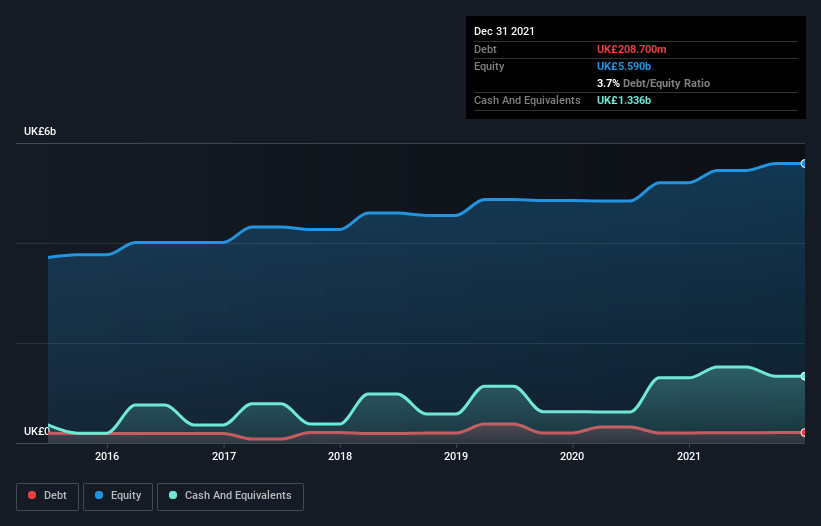Is Barratt Developments (LON:BDEV) Using Too Much Debt?
Legendary fund manager Li Lu (who Charlie Munger backed) once said, 'The biggest investment risk is not the volatility of prices, but whether you will suffer a permanent loss of capital.' So it seems the smart money knows that debt - which is usually involved in bankruptcies - is a very important factor, when you assess how risky a company is. Importantly, Barratt Developments plc (LON:BDEV) does carry debt. But the real question is whether this debt is making the company risky.
What Risk Does Debt Bring?
Debt and other liabilities become risky for a business when it cannot easily fulfill those obligations, either with free cash flow or by raising capital at an attractive price. Part and parcel of capitalism is the process of 'creative destruction' where failed businesses are mercilessly liquidated by their bankers. However, a more usual (but still expensive) situation is where a company must dilute shareholders at a cheap share price simply to get debt under control. Of course, plenty of companies use debt to fund growth, without any negative consequences. The first step when considering a company's debt levels is to consider its cash and debt together.
See our latest analysis for Barratt Developments
What Is Barratt Developments's Net Debt?
As you can see below, Barratt Developments had UK£208.7m of debt, at December 2021, which is about the same as the year before. You can click the chart for greater detail. However, it does have UK£1.34b in cash offsetting this, leading to net cash of UK£1.13b.
How Strong Is Barratt Developments' Balance Sheet?
We can see from the most recent balance sheet that Barratt Developments had liabilities of UK£1.44b falling due within a year, and liabilities of UK£512.7m due beyond that. On the other hand, it had cash of UK£1.34b and UK£152.3m worth of receivables due within a year. So its liabilities total UK£467.7m more than the combination of its cash and short-term receivables.
Since publicly traded Barratt Developments shares are worth a total of UK£5.01b, it seems unlikely that this level of liabilities would be a major threat. However, we do think it is worth keeping an eye on its balance sheet strength, as it may change over time. While it does have liabilities worth noting, Barratt Developments also has more cash than debt, so we're pretty confident it can manage its debt safely.
On top of that, Barratt Developments grew its EBIT by 51% over the last twelve months, and that growth will make it easier to handle its debt. The balance sheet is clearly the area to focus on when you are analysing debt. But ultimately the future profitability of the business will decide if Barratt Developments can strengthen its balance sheet over time. So if you want to see what the professionals think, you might find this free report on analyst profit forecasts to be interesting.
Finally, a company can only pay off debt with cold hard cash, not accounting profits. While Barratt Developments has net cash on its balance sheet, it's still worth taking a look at its ability to convert earnings before interest and tax (EBIT) to free cash flow, to help us understand how quickly it is building (or eroding) that cash balance. During the last three years, Barratt Developments produced sturdy free cash flow equating to 56% of its EBIT, about what we'd expect. This cold hard cash means it can reduce its debt when it wants to.
Summing up
We could understand if investors are concerned about Barratt Developments's liabilities, but we can be reassured by the fact it has has net cash of UK£1.13b. And we liked the look of last year's 51% year-on-year EBIT growth. So we don't think Barratt Developments's use of debt is risky. The balance sheet is clearly the area to focus on when you are analysing debt. However, not all investment risk resides within the balance sheet - far from it. Case in point: We've spotted 2 warning signs for Barratt Developments you should be aware of.
When all is said and done, sometimes its easier to focus on companies that don't even need debt. Readers can access a list of growth stocks with zero net debt 100% free, right now.
Have feedback on this article? Concerned about the content? Get in touch with us directly. Alternatively, email editorial-team (at) simplywallst.com.
This article by Simply Wall St is general in nature. We provide commentary based on historical data and analyst forecasts only using an unbiased methodology and our articles are not intended to be financial advice. It does not constitute a recommendation to buy or sell any stock, and does not take account of your objectives, or your financial situation. We aim to bring you long-term focused analysis driven by fundamental data. Note that our analysis may not factor in the latest price-sensitive company announcements or qualitative material. Simply Wall St has no position in any stocks mentioned.

 Yahoo Finance
Yahoo Finance 
